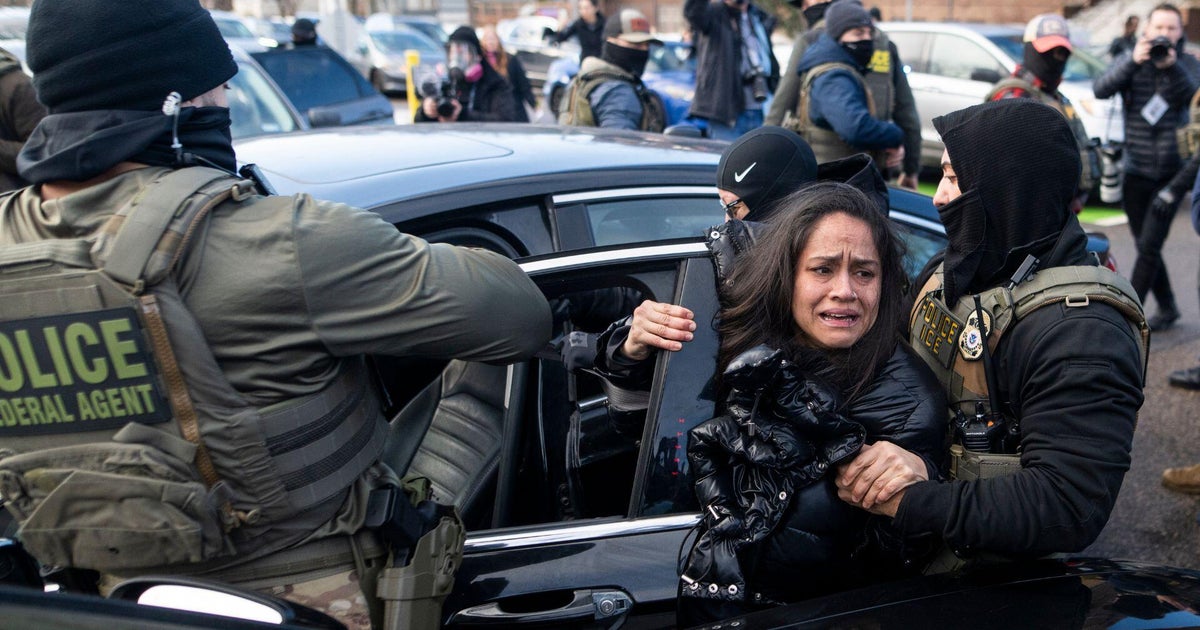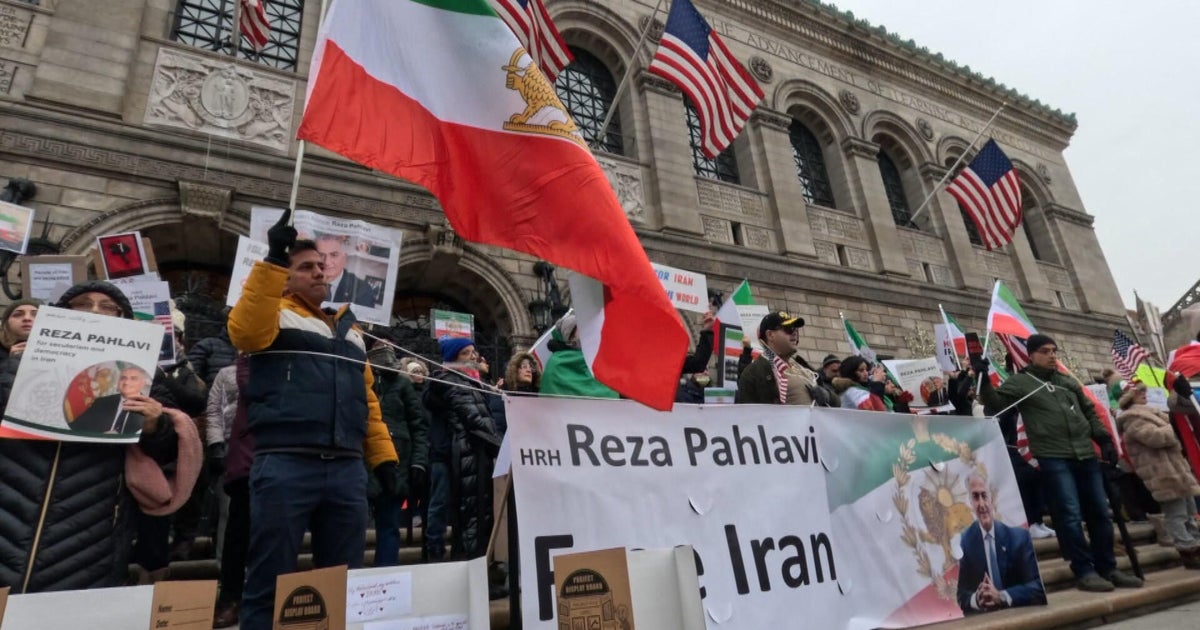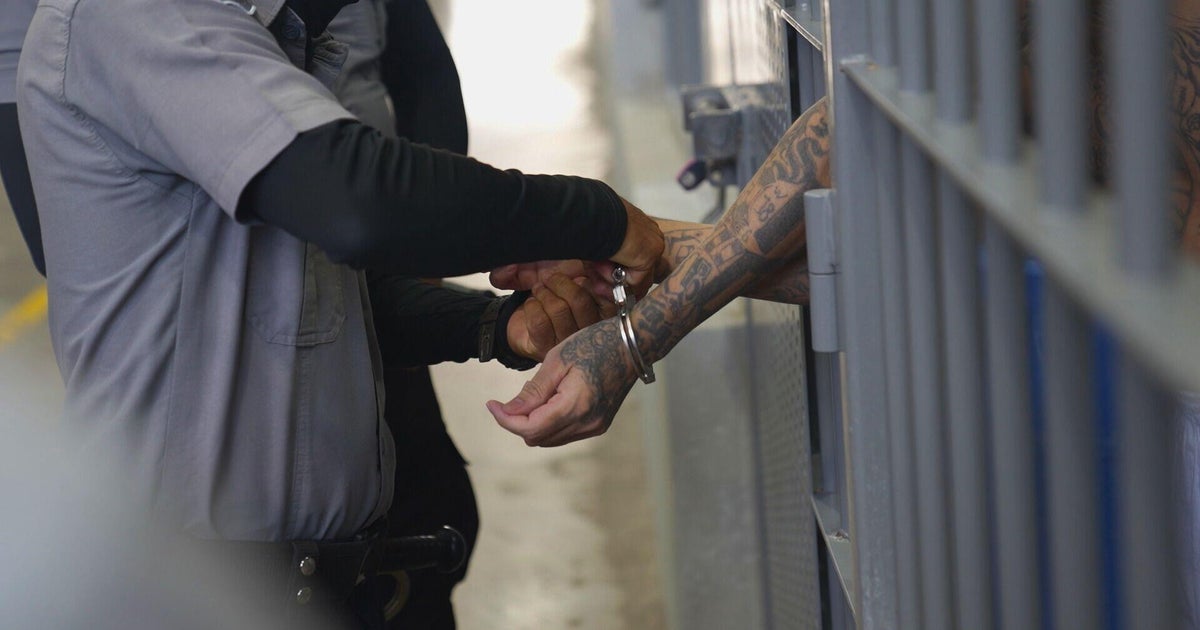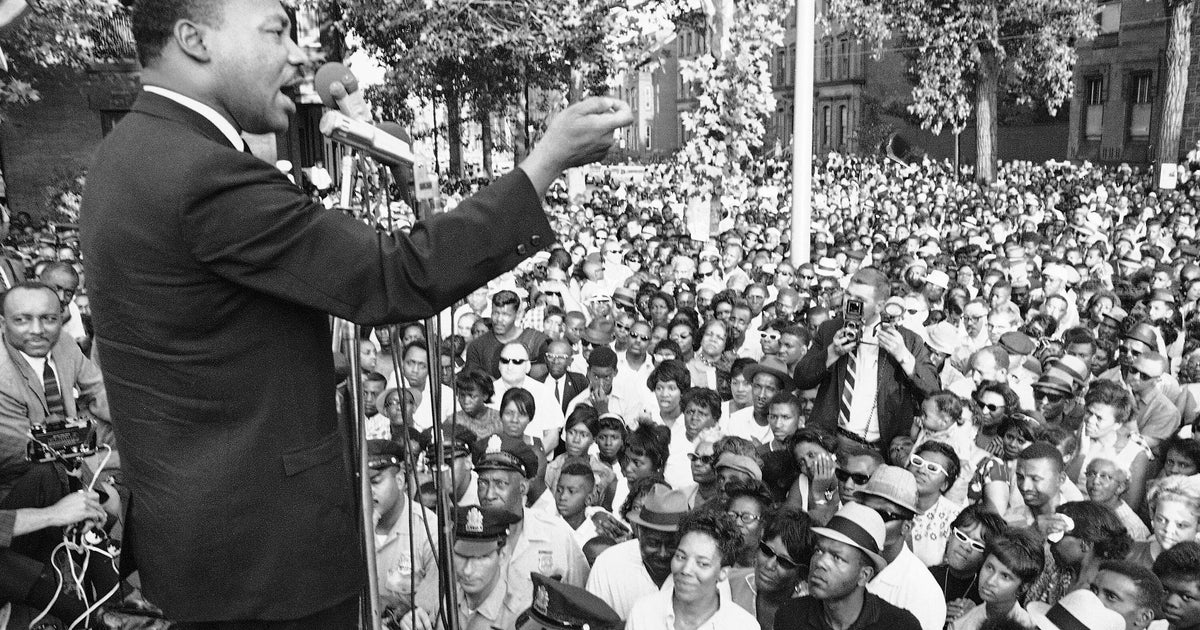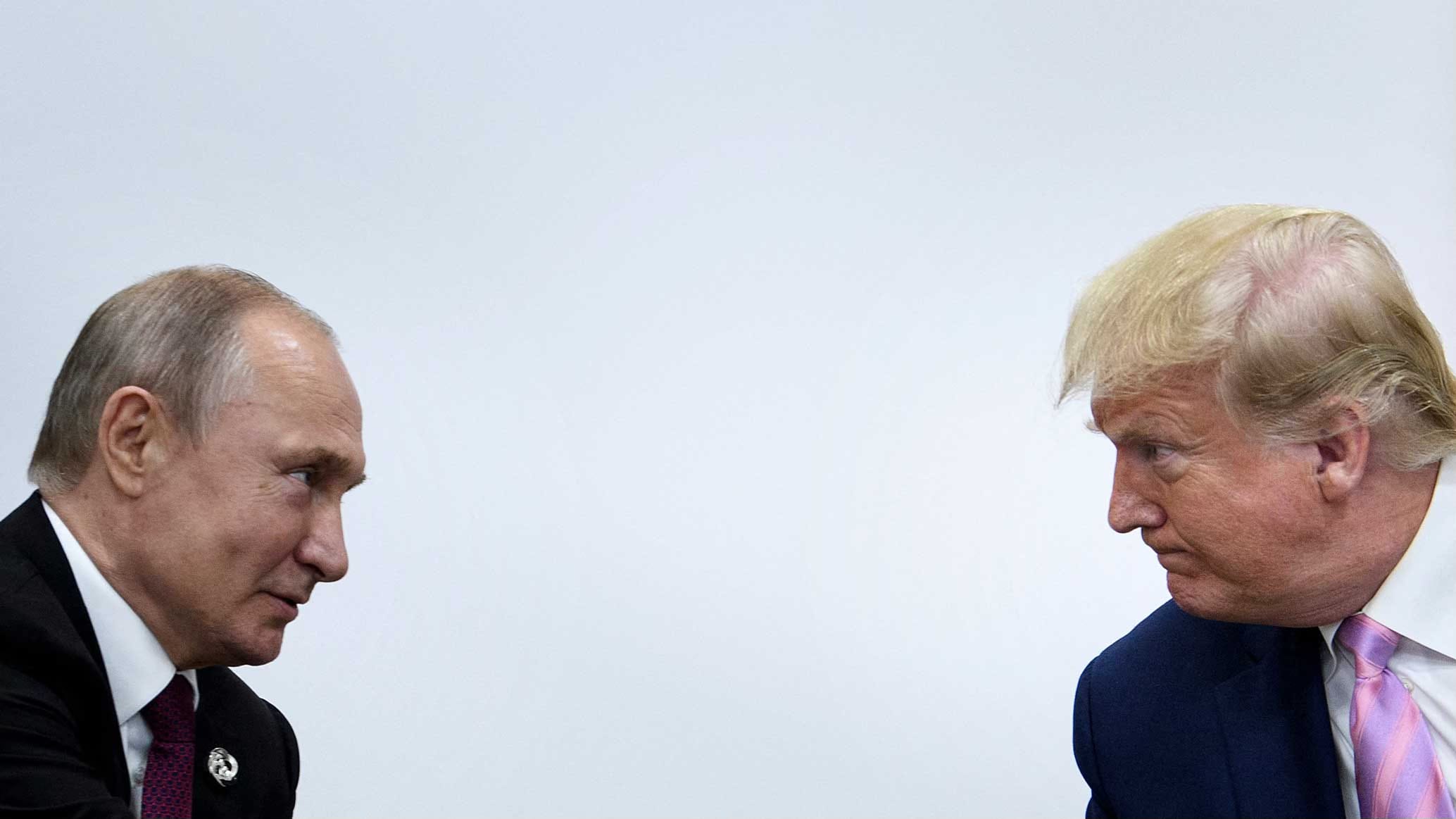Pussy Riot punk band remains defiant of Putin's Russia
The following script is from "Crackdown in Russia" which aired on March 24, 2013, and was rebroadcast June 23, 2013. Lesley Stahl is the correspondent. Shachar Bar-On and Alexandra Poolos are the producers.
Since he's been in power in Russia, Vladimir Putin has steadily cracked-down on democratic freedoms and the protesters who support them -- a crackdown that intensified after his re-election as president over a year ago. Nothing symbolizes this better than the arrest in March 2012, of a group of young feminists after they staged a protest against Putin in Moscow's largest cathedral. It got a lot of attention, since the Orthodox Church is one of the most revered institutions in post-Soviet Russia.
As we first reported in March, the young women have become the poster girls of Russian dissent, unlikely considering they're a punk band on YouTube that makes lewd gestures in cartoonish get-ups. Most of what they do is deliberately offensive; it might offend you -- like, for starters, their obscene, but attention-grabbing name: Pussy Riot.
This is what got them arrested. Five girls in the church, in their trademark masks called balaklavas praying to the Virgin Mary to drive Putin away.
Using vile obscenities, they blast Putin for limiting freedoms and jailing protesters. The whole thing lasts only 51 seconds before they're shut down. It looked silly like a prank, which made the harsh punishments seem so out of proportion: two of them were sent to labor camps for this.
Now a year later, we tracked down the other three who were at the church. Two are in hiding; Katya Samutsevich isn't. She was put on trial and convicted, but released after seven months because she never actually danced on the altar. That's her that day in white.
Lesley Stahl: Do you have any regrets about what happened that day?
Katya Samutsevich: No, of course not. Look what's happened. Since the election, Putin has brought in a new level of repressive government measures in Russia.
She says they chose Moscow's biggest Russian Orthodox cathedral because in last year's election the patriarch called Putin a miracle from God.
Katya Samutsevichl: The elections weren't legitimate. There was vote rigging. There was false counting. It was clear that the president put himself in power.
Lesley Stahl: But are you advocating the overthrow of this government here?
Katya Samutsevichl: Yes. We want the government to leave power, because we consider it illegitimate. But we're advocating for a peaceful overthrow.
The band members are idealistic and brave...and well-educated. Katya is a computer engineer. She was living at home with her dad and working in a government arms plant when she decided to become a political provocateur.
She began with anti-authority stunts, like surprising female cops by kissing them, then posting the video online.
Her partner in crime was Nadia Tolokonnikova, a philosophy student and seasoned agitator.
They formed their punk band as Moscow was boiling over with protests in 2011, after Putin announced his bid for reelection. It was Russia's "Arab Spring" and the band, made up of 12 or so feminists who call themselves girls or "devooshky" - set out to change the world.
They staged public disturbances like this one in the middle of Red Square, right under the Kremlin, howling, "Riot! Riot!" Shouting a profanity: that Putin was so scared of protesters - quote: "he peed in his pants."
Lesley Stahl: Here you girls are, you're clearly really intelligent and you put on these crude, almost juvenile acts.
Katya Samutsevichl: This is the language we've chosen, the language of punk. It's not highly intellectual. It's intentionally lowered, dumbed-down. We've chosen this specific kind of language to attract attention.
The Kremlin didn't pay much attention until the church performance, because that went viral. Katya, Nadia and another girl, Maria Alyokhina were arrested, and they quickly became a cause celebre.
South Park, Amnesty International, Madonna pled for their release. Their supporters, like chessmaster Garry Kasparov who's been arrested many times for protesting against Putin, thought the case was trumped up.
Lesley Stahl: A lot of people I know who you would respect think that to be obscene in a church on the altar was a step too far.
Garry Kasparov: It was not a blasphemy. They asked Virgin Mary to kick out the dictator. I believe it was an act of civil courage. And they were exercising their rights.
Lesley Stahl: But the words were offensive. They cussed.
Garry Kasparov: The words were offensive for Putin and for patriarch, and I believe they both deserved it.
But what exactly was the crime the band committed? Sergei Markov, an academic who serves as a political spokesman for Putin, says authorities had trouble coming up with one.
Lesley Stahl: What exact law did they break? You know, some people say all they did was sing a song. They didn't even sing it. They lip-synced it.
Sergei Markov: On this issue, that's right. It's the problem with-- to find the law. Finally, the court found the law.
What they found was the charge of "hooliganism motivated by religious hate" because the girls were disrespectful to the church and Markov says if they had not been given a substantial sentence believers would have rioted.
Lesley Stahl: Did the authorities intervene and say, "Give them a harsh penalty, much harsher than they deserve because of a fear of violence?"
Sergei Markov: Absolutely.
Lesley Stahl: But is that right? Do you think that's right to stretch the law?
Sergei Markov: It's duty of authorities to stop the violence.
Lesley Stahl: But there hadn't been any violence. You're predicting--
Sergei Markov: No, no. It's a very clear prediction.
In their trial the girls were defiant, Nadia pumping her fist as she was led into court. If Putin gave them a stage, they were going to use it.
Lesley Stahl: Did you ever consider begging for forgiveness, throwing yourself at the mercy of the court?
Katya Samutsevichl: No. The whole process was so unfair to us from the beginning. It's strange when you're innocent. Are you supposed to ask for forgiveness from the judge who's ready to put you away for several years? No, this wasn't even discussed.
Lesley Stahl: Were you in the courtroom?
Pyotr Verzilov: Yes.
Lesley Stahl: All the time?
Pyotr Verzilov: Basically every day.
Pyotr Verzilov, Nadia's husband and fellow political activist, saw his wife and the other two on display, in a cage, an eerie echo of a Soviet show trial. When the verdict came, it was a jolt: two years in prison.
Pyotr Verzilov: For me, it was obviously shock.
Lesley Stahl: That's the last thing you expected.
Pyotr Verzilov: Yes.
Lesley Stahl: What about the girls?
Pyotr Verzilov: Well the girls were smiling when it happened.
Lesley Stahl: They were smiling?
Pyotr Verzilov: When you're really put in a helpless situation, when you understand that your life is decided by political motives and a lot of people really do understand that you're fighting for the good cause, the best thing you can do is actually smile.
Katya was released, but Maria and Nadia, both young mothers of toddlers, were sent to faraway penal colonies. When the verdict was read, protests erupted outside the courtroom, Garry Kasparov and two dozen others were arrested.
Lesley Stahl: Is this case of this punk rock group, is it really significant? Is it important?
Garry Kasparov: I think it is. Any attack on Putin is now a crime. Russia is now it's-- you may call it a modern dictatorship because, you know, attacking the ruler becomes-- can be punished by the criminal court.
Lesley Stahl: And they represent that shift.
Garry Kasparov: Yes. They exposed it.
Lesley Stahl: What was it about them that drew so much attention?
Garry Kasparov: You may say whatever you want about their performance, but it was innocuous. It was not threatening. And the state machine, KGB, Church, you know, all going after them. I think it's just, you know, there's some sort of a version of-- it's not even David - Goliath. Just you know, Goliath versus girls.
That was not lost on those close to Putin.
Lesley Stahl: It looked like a very heavy-handed action against these weak, little girls. Way over-reaction.
Sergei Markov: Ya, we know this.
Lesley Stahl: And no one cares?
Sergei Markov: No no no. We care about this.
Lesley Stahl: The image--
Sergei Markov: Yeah, we doesn't like such awful image of Russia because it create problems for us. This image doesn't allow millions of Russians who want to travel to Germany, Italy, France and to have vacations there easily, they don't allow to do this. It stops investments to Russian economy.
Lesley Stahl: All because of the trial?
Sergei Markov: Yes of course because bad image.
Lesley Stahl: All 'cause of the trial of those girls?
Sergei Markov: Of course, but we have to do because we have to protect ourselves because if we will be weak, our image will be even worse.
It doesn't help the image that Nadia and Maria are suffering in harsh prison conditions: Maria is in perm, where temperatures can dip to 50 below zero. Back in Moscow, her husband is raising their 5-year-old son alone. We accompanied Nadya's husband Pyotr on a 7-hour drive to Mordovia to see her. He says she works grueling shifts sewing uniforms and that she's seen their 5-year-old daughter Gera only once.
Lesley Stahl: Did you and Nadia talk about your child and the consequences? I'm talking about beforehand, the consequences of this little girl being raised without her mother.
Pyotr Verzilov: Well, obviously we did talk about that enormously. But if you really want to change history, you have to be able to put everything you have on the line, and then you do have a chance of changing it. I mean, changing history is not a hobby. It's not something you can take part-time.
But there were four girls on the altar that day: what happened to the other two? Well, they went into hiding, we found one of them still hiding in Moscow a year later.
Lesley Stahl: So what do they call you?
Kot: Kot.
Lesley Stahl: Kot. You're the drummer in the group. Are you good?
Kot: Ynnhha.
Kot agreed to go on television for the first time, though only in disguised voice and balaklava. She wanted to show us that the band still exists, so she led us into a netherworld where some members of the band get together. She says very few people know her identity.
Lesley Stahl: Do your parents know that you're in the protest?
Kot: They know. They're not really happy about it. My dad, he's religious. He thought what we did it was sort of an anti-Christ kind of act.
She had managed to dodge the authorities after the performance by hiding in the rat-infested music studio where they had recorded the song that got her band mates arrested. Kot believes she will be left alone now, as long as she keeps a low profile.
Lesley Stahl: Are you at all worried that just giving us this interview will be seen as a protest?
Kot: I'm a little worried. It's a feeling similar to what I had before the performances we did.
Lesley Stahl: Do you want it to be seen as a protest?
Kot: I do. I want this. I'm here to say you shouldn't give up. What happened to us is unacceptable.
It's been over a year. President Putin is firmly back in power with solid public support. As for the opposition: several organizers of last year's protests are facing prosecution. Nadya and Maria were denied parole. The band has not staged a single action since the trial, and their videos are now banned.
Lesley Stahl: Mr. Putin seems stronger than ever. There are new laws against dissent. It sounds like it was David and Goliath and Goliath won.
Katya Samutsevichl: I don't think it's like that. It's a fight, it's an ongoing fight. Just because there was a court case doesn't mean that we're going to stop and shut our mouths. We have a lot of things to say. We're going to continue to work, continue to do what we do.
So the battle of Goliath and the girls goes on, but like a Russian novel, it's complicated. The polls show that most Russians were offended by that dance on the altar, but most also think the punishment was way too severe.
